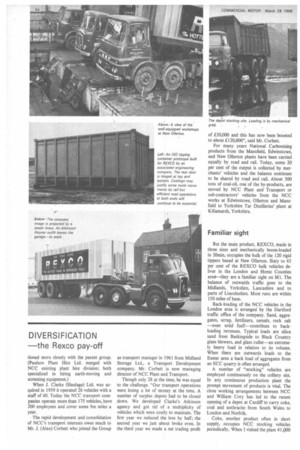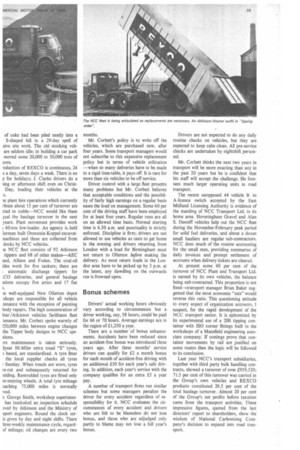2 the
Page 55

Page 56

Page 57

If you've noticed an error in this article please click here to report it so we can fix it.
Reno pay off
A C-licensee who has found road haulage a profitable investment
John Darker, AMBIM
tECENT YEARS an increasing num)f large manufacturing units have acd control of one or more road trans operators. Sometimes this has been ipted by the need to ensure efficient and omical deliveries—a key factor in a xtitive marketing situation. There may he wish to diversify—and the road port industry which is fast expanding is bvious field for prudent investors. Be the Transport Bill proposal to free account operators to carry return loads mooted, many manufacturers found it table to control professional haulage with A-licences partially to subsidize delivery costs.
fie National Carbonising Co. Ltd. 3e processed fuel product REXCO is a ehold name, saw the wisdom of entering transport in 1959. The solid fuel indusFaced competition from gas, electricity oil heating before the discoveries of .h Sea gas and in the long term some iderable decline seemed inevitable. But 17's decision to expand its interests does mean that strenuous and imaginative ts will not be made to develop tradi11 coal-based products.
[nce the acquisition of J. Clarke (Haul
Ltd. of New 011erton, Notts, in 1959 road transport interests of NCC have inded greatly. Philip Smith (Beeston) —it does all the road transport. Tries of the Beeston Boiler Company—
acquired in 1965. I was interested to
to Mrs. K. M. Cooper, an active :tor of the Philip Smith concern, se family can boast of some 70 years contractors for the very specialized ;ton Boiler haulage work.
. D. Brown Ltd.—with tippers specializin fly ash removal and disposal from er stations—and Paulson Haulage Ltd. ed the Group in 1967. In April 1968, C Plant and Transport Ltd. was incortted to associate the companies men tioned more closely with the parent group. (Paulson Plant Hire Ltd. merged with NCC existing plant hire division; both specialized in hiring earth-moving and screening equipment.) When J. Clarke (Haulage) Ltd. was acquired in 1959 it operated 26 vehicles with a staff of 40. Today the Nee transport companies operate more than 175 vehicles, have 200 employees and cover some 9m miles a year.
The rapid development and consolidation of NCC's transport interests owes much to Mr. J. (Alan) Corbett who joined the Group as transport manager in 1961 from Midland Storage Ltd., a Transport Development company. Mr. Corbett is now managing director of NCC Plant and Transport.
Though only 28 at the time. he was equal to the challenge. "Our transport operations were losing a lot of money at the time. A number of surplus depots had to be closed down. We developed Clarke's Atkinson agency and got rid of a multiplicity of vehicles which were costly to maintain. The first year we reduced the loss by half; the second year we just about broke even. In the -third year we made a net trading profit of £30,000 and this has now been boosted to about £120,000", said Mr. Corbett.
For many years National Carbonising products from the Mansfield, Edwinstowe, and New 011erton plants have been carried equally by road and rail. Today, some 20 per cent of the output is collected by merchants' vehicles and the balance continues to be shared by road and rail. About 300 tons of coal-oil, one of the by-products, are moved by NCC Plant and Transport or sub-contractors' vehicles from the NCC works at Edwinstowe. 011erton and Mansfield to Yorkshire Tar Distilleries' plant at Killamarsh, Yorkshire.
Familiar sight
But the main product, REXCO, made in three sizes and mechanically boom-loaded in 20min, occupies the bulk of the 120 rigid tippers based at New 011erton. Sixty to 65 per cent of the REXCO bulk vehicles deliver in the London and Home Counties areat—they are a familiar sight on MI. The balance of outwards traffic goes to the Midlands, Yorkshire, Lancashire and to parts of Lincolnshire. Most runs are within 150 miles of base.
Back-loading of the NCC vehicles in the London area is arranged by the Dartford traffic office of the company. Sand, aggregates, scrap, fertilizers, cereals, rock salt —even solid fuel!—contribute to backloading revenues. Typical loads are silica sand from Barkingside to Black Country glass blowers, and glass cullet—an extremely heavy load in relation to its volume. When there are outwards loads to the Exeter area a back load of aggregates from an ECC quarry is often arranged.
A number of -stocking" vehicles are employed continuously on the colliery site. In any continuous production plant the prompt movement of products is vital. The close working arrangements between NCC and William Cory has led to the recent opening of a depot at Cardiff to carry coke, coal and anthracite from South Wales to London and Norfolk.
Coke, another product often in short supply, occupies NCC stocking vehicles periodically. When I visited the plant 41,900 of coke had been piled neatly into a S-shaped hill in a 29-day spell of sive site work. The old stocking vehare seldom idle; in building a car park moved some 20,000 to 30,000 tons of core.
.oduction of REXCO is continuous, 24 s a day, seven days a week. There is no p for holidays; J. Clarke drivers do a ling or afternoon shift even on ChristDay, loading their vehicles at the :s.
le plant hire operations which currently ribute about 15 per cent of turnover are eted to treble—NCC would like them 'nal the haulage turnover in the next years. Plant movement provides work t 60-ton low-loader. An agency is held ierman built Orenstein-Koppel excavatnachines and these are collected from docks by NCC vehicles.
ie NCC fleet consists of 92 Atkinson tippers and 68 of other makes—AEC and, Albion and Foden. The coal-oil ides work for five tankers; there are automatic discharge tippers for :CO deliveries, and general haulage ations occupy five artics and 17 flat s.
ie well-equipped New (Merton depot .shops are responsible for all vehicle tenance with the exception of painting body repairs. The high concentration of lner /Atkinson vehicles facilitates fleet tenance. Mr. Corbett spoke warmly of 150,000 miles between engine changes the Tipper body designs to NCC spettions.
rre maintenance is taken seriously. lyear Hi-Miler extra tread "S" tyres,
based, are standardized. A tyre fitter the local supplier checks all tyres r Sunday. When treads are worn, tyres re-cut and subsequently returned for ,ulding. Remoulded tyres are fitted only m-steering wheels. A total tyre mileage mching 75,000 miles is normally ;ved.
r, George Smith, workshop superintenhas instituited an inspection schedule 3ved by Atkinson and the Ministry of sport engineers. Round the clock seris given by day and night shifts. There hree-weekly maintenance cycle, regardof mileage; oil changes are every two months.
Mr. Corbett's policy is to write off the vehicles, which are purchased new, after four years. Some transport managers would not subscribe to this expensive replacement policy but in terms of vehicle utilization —when so many deliveries have to be made to a rigid time-table, it pays off. It is rare for more than six vehicles to be off service.
Driver control with a large fleet presents many problems but Mr. Corbett believes that acceptable conditions and the possibility of fairly high earnings on a regular basis eases the load on management. Some 60 per cent of the driving staff have been employed for at least four years. Regular runs are all on an allowed time basis. Normal starting time is 6.30 a.m. and punctuality is strictly enforced. Discipline is firm; drivers are not allowed to use vehicles as taxis to get home in the evening and drivers returning from London with a load for Birmingham must not return to Merton before making the delivery. As most return loads in the London area have to be picked up by 3 p.m. at the latest, any dawdling on the outwards run is frowned upon.
Bonus schemes
Drivers' actual working hours obviously vary according to circumstances but a driver working, say, 58 hours, could be paid for 66 or 70 hours. Average earnings are in the region of £1,250 a year.
There are a number of bonus enhancements. Accidents have been reduced since an accident-free bonus was introduced three years ago. After three months' service drivers can qualify for £2 a month bonus for each month of accident-free driving with an additional £50 for each year's safe driving. In addition, each year's service with the company qualifies for an extra £5 a year pay.
A number of transport firms run similar schemes but some managers penalize the driver for every accident regardless of responsibility for it. NCC evaluates the circumstances of every accident and drivers who are felt to be blameless do not lose bonus, and those who are adjudged only partly to blame may not lose a full year's bonus. Drivers are not expected to do any daily routine checks on vehicles, but they are expected to keep cabs clean. All pre-service checks are undertaken by nightshift personnel.
Mr. Corbett thinks the next two years in transport will be more exacting than any in the past 20 years but he is confident that his staff will accept the challenge. He foresees much larger operating units in road transport.
The recent unopposed 44 vehicle Bto A-licence switch accepted by the East Midland Licensing Authority is evidence of the standing of NCC Transport Ltd. in its home area. Hoveringham Gravel and Alan S. Denniff vehicles help out the NCC fleet during the November-February peak period for solid fuel deliveries, and about a dozen small hauliers are regular sub-contractors. NCC does much of the routine accounting for the small men, providing summaries of daily invoices and prompt settlement of accounts when delivery tickets are cleared.
At present some 60 per cent of the turnover of NCC Plant and Transport Ltd. is earned by its own vehicles, the balance being sub-contracted. This proportion is not fixed—I-transport manager Brian Baker suggested that the most economic "mix" would reverse this ratio. This questioning attitude to every aspect of organization accounts, I suspect, for the rapid development of the NCC transport sector. It is epitomized by its experimental use of a 20ft tipping container with ISO corner fittings built in the workshops of a Mansfield engineering associate company. If costings prove that container movements by rail are justified on some routes then the logic will be followed to its conclusion.
Last year NCC's transport subsidiaries, together with third party bulk handling contracts, showed a turnover of over £959,529: 71.5 per cent of this turnover was carried in the Group's own vehicles and REXCO products constituted 26.5 per cent of the total haulage turnover. Almost 20 per cent of the Group's net profits before taxation came from the transport activities. These impressive figures, quoted from the last directors' report to shareholders, show the wisdom of National Carbonising Company's decision to expand into road transport.










































































































